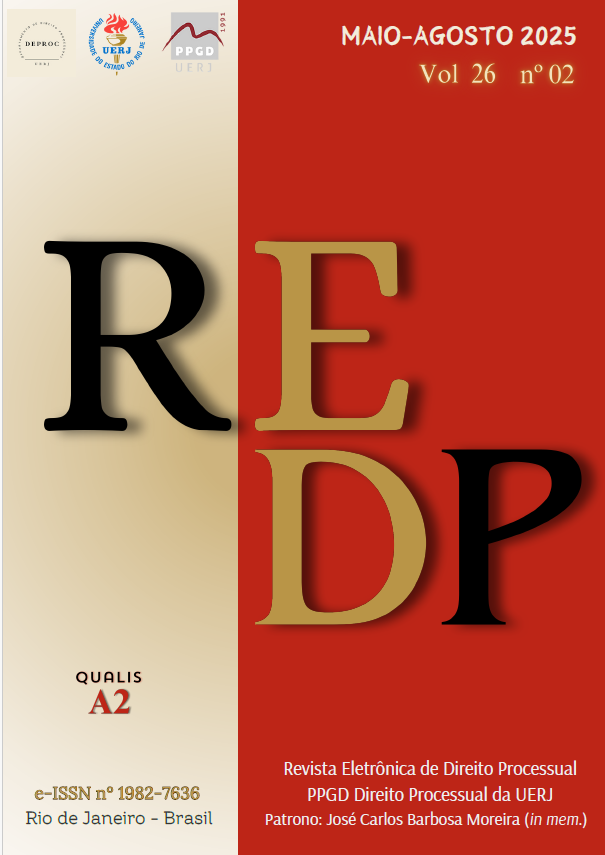PROCEDURAL GOOD FAITH AS A PRINCIPLE OF JUSTICE
DOI:
https://doi.org/10.12957/redp.2025.90841Resumo
In most countries, law enforcement authorities actively refer to the principle of procedural good faith when adjudicating civil cases, while in many countries, including the Russian Federation, this principle has not yet been formalized. This establishes a foundation for discussing procedural good faith's content and its relationship to other principles of justice. For this reason, the purpose of this scientific article was to conduct a comprehensive study of the phenomenon of procedural good faith in order to identify it as a separate principle of justice. The author's conclusion was that the rationale for implementing provisions on good faith in the civil process of most states is objective based on the comparative legal method of research. Moreover, in fact, the principle of procedural good faith already exists in many developed legal systems, without creating, at the same time, a potential threat to other (more classical) principles of effectuation of justice. The scientific novelty of the study conducted by the author is based on taking into account modern global trends in the development of civil procedure. The author considers the general development of the justice system's principles, which is characterized by the disappearance or narrowing of the scope of old, no longer relevant principles, and the emergence of those principles of justice effectuation that better meet modern realities, as well as the emerging trend of professionalizing civil proceedings. For this reason, the author once again confirms the obvious need (and particular relevance) for a proper study of the principle of procedural good faith, with its inherent content, its main features and properties, as well as the impact of the process of digitalization of justice on it.
Downloads
Publicado
Como Citar
Edição
Seção
Licença
Copyright (c) 2025 Anastasia V. Melnikova

Este trabalho está licenciado sob uma licença Creative Commons Attribution 4.0 International License.
Todos os artigos publicados na Revista Eletrônica de Direito Processual (REDP) (Departamento de Direito Processual, Universidade do Estado do Rio de Janeiro, Brasil) são licenciados por meio de uma Licença Creative Commons - Atribuição 4.0 Internacional (CC BY 4.0).
Os autores retêm os direitos autorais de seu artigo e concordam em licenciar seu trabalho com a licença CC BY 4.0, aceitando assim os termos e condições específicos desta licença disponíveis no seguinte website: https://creativecommons.org/licenses/by/4.0/legalcode.
- Os autores concedem à REDP o direito de primeira publicação, de se identificar como publicadora original do trabalho e concedem à revista uma licença de direitos não exclusivos para utilizar o trabalho das seguintes formas: Reproduzir, vender e distribuir cópias eletrônicas ou impressas do manuscrito como um todo, de partes específicas do manuscrito e de suas traduções para qualquer idioma;
- O uso do artigo por terceiros é livre, contanto que a integridade da publicação seja mantida e seus autores originais, periódico de primeira publicação e detalhes de citação sejam identificados.
Dentro dos termos da licença, os autores podem entrar em acordos contratuais adicionais separados para a distribuição não exclusiva da versão publicada do trabalho na revista.
Copyright and Licensing
All articles published in the Procedural Law Electronic Review (REDP) (Department of Procedural Law, State University of Rio de Janeiro, Brazil) are licensed under a Creative Commons License - Attribution 4.0 International (CC BY 4.0).
- Authors retain copyright to their article and agree to license their work under the CC BY 4.0 license, thereby accepting the specific terms and conditions of this license available at the following website: https://creativecommons.org/licenses/by/4.0/ legal code.
- Authors grant REDP the right of first publication, to identify itself as the original publisher of the work, and grant the journal a non-exclusive license to use the work in the following ways: Reproduce, sell and distribute electronic or printed copies of the manuscript as a whole, of specific parts of the manuscript and its translations into any language;
- Use of the article by third parties is free, as long as the integrity of the publication is maintained and its original authors, first publication journal, and citation details are identified.
Within the terms of the license, authors may enter into separate additional contractual agreements for the non-exclusive distribution of the published version of the work in the journal.




